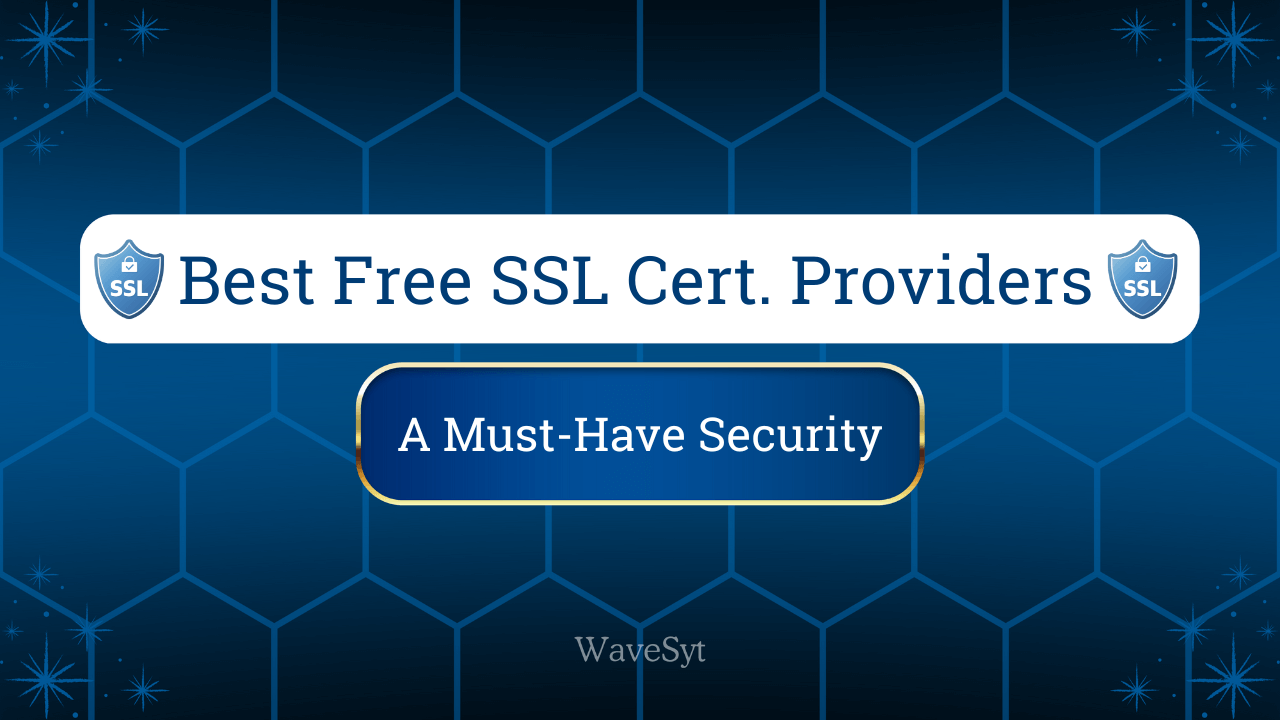Remember when SSL certificates used to cost hundreds of dollars per year? Those days are long gone, my friend. Today, you can secure your website with military-grade encryption without spending a breaking a bank, for that matter.
Think of an SSL certificate as a digital bodyguard for your website. Just like you wouldn’t leave your house unlocked, you shouldn’t leave your website unprotected. But here’s the beautiful part: getting that protection doesn’t have to drain your wallet.
Whether you’re running a small blog, launching your first online store, or managing multiple websites, free SSL certificates can provide the same level of security as their expensive counterparts. In this guide, we’ll explore 12 reliable providers that offer free SSL certificates, helping you make an informed choice that fits your specific needs.
SSL Certificates: A Must-Have Security
Before we dive into the providers, let’s clear up what SSL certificates do. SSL (Secure Sockets Layer) certificates create an encrypted connection between your website and your visitors’ browsers. When someone visits your site, all the data they send – passwords, credit card numbers, personal information – gets scrambled into an unreadable code that only your server can decode.
You’ll know a website has SSL protection when you see that little padlock icon in your browser’s address bar, and the URL starts with “https://” instead of just “http://”. Google Chrome now shows a “Not Secure” warning for websites without SSL, which can seriously hurt your credibility and search rankings.
Here’s why SSL certificates are non-negotiable:
- Search Engine Rankings: Google has been using HTTPS as a ranking factor since 2014. Websites with SSL certificates get a small but measurable boost in search results.
- Customer Trust: Studies show that 84% of users will abandon a purchase if they know the site isn’t secure. That padlock icon acts like a trust badge, reassuring visitors that their information is safe.
- Legal Compliance: Many privacy regulations, including GDPR and various data protection laws, require proper encryption of personal data.
- Browser Compatibility: Modern browsers are becoming increasingly strict about unsecured sites, sometimes blocking access entirely or showing scary warning messages.
The good news? You don’t need to spend $100-500 annually on premium SSL certificates. Free options can provide the same encryption strength and browser trust indicators.
Different Types of SSL Certificates
Not all SSL certificates are created equal. Think of them like different types of ID cards – some just verify your name, while others do extensive background checks.
- Domain Validated (DV) Certificates are the most basic type. They only verify that you control the domain name. The certificate authority sends an email to your domain or checks for a specific file on your server. Most free SSL certificates fall into this category, and they’re perfectly fine for blogs, small businesses, and personal websites.
- Organisation Validated (OV) Certificates go a step further by verifying your business information. The certificate authority checks public records to confirm your company exists and is legitimate. These typically cost money and take longer to issue.
- Extended Validation (EV) Certificates involve the most rigorous verification process. The certificate authority conducts extensive background checks on your organisation. These are the certificates that show your company name in green in the browser address bar, though modern browsers have moved away from this visual indicator.
For most websites, DV certificates provide excellent security. The encryption strength is identical across all types – the difference lies in the verification process and trust indicators, not the actual protection level.
Best Free SSL Certificate Providers:
1. Let’s Encrypt: The People’s Champion
Let’s Encrypt revolutionised the SSL industry when it launched in 2016. This non-profit certificate authority has issued over 3 billion free SSL certificates, making the web more secure for everyone.
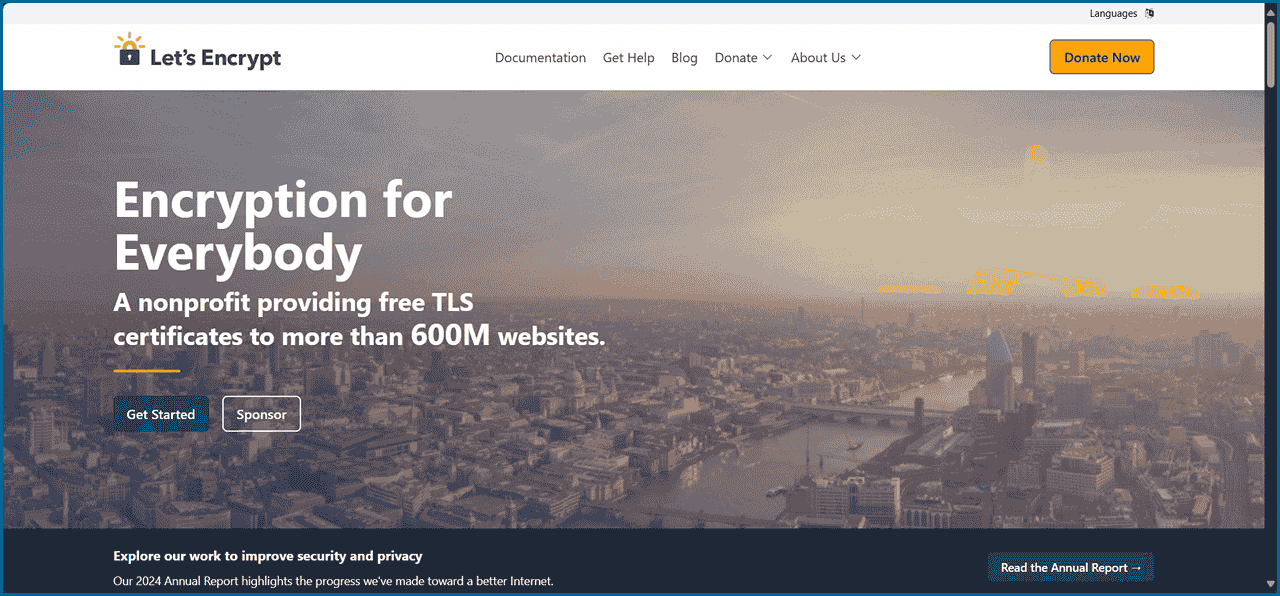
What makes Let’s Encrypt special:
- Completely free, always
- Automated certificate management through the ACME protocol
- Supports wildcard certificates (securing *.example.com)
- Trusted by all major browsers
- 90-day validity with automatic renewal
Perfect for: Any website owner who wants set-it-and-forget-it SSL security. Most web hosting providers now offer one-click Let’s Encrypt integration.
The catch: Certificates expire every 90 days, but this enhances security by forcing regular updates. Most hosting providers handle renewal automatically, so you’ll never notice.
Getting started: If your web host supports Let’s Encrypt (most do), you can usually enable it with a single click in your control panel. For manual installation, you’ll use Certbot, Let’s Encrypt’s recommended client software.
2. ZeroSSL: The User-Friendly Alternative
ZeroSSL positions itself as a more user-friendly alternative to Let’s Encrypt, offering both free SSL and paid SSL certificates with a polished web interface.
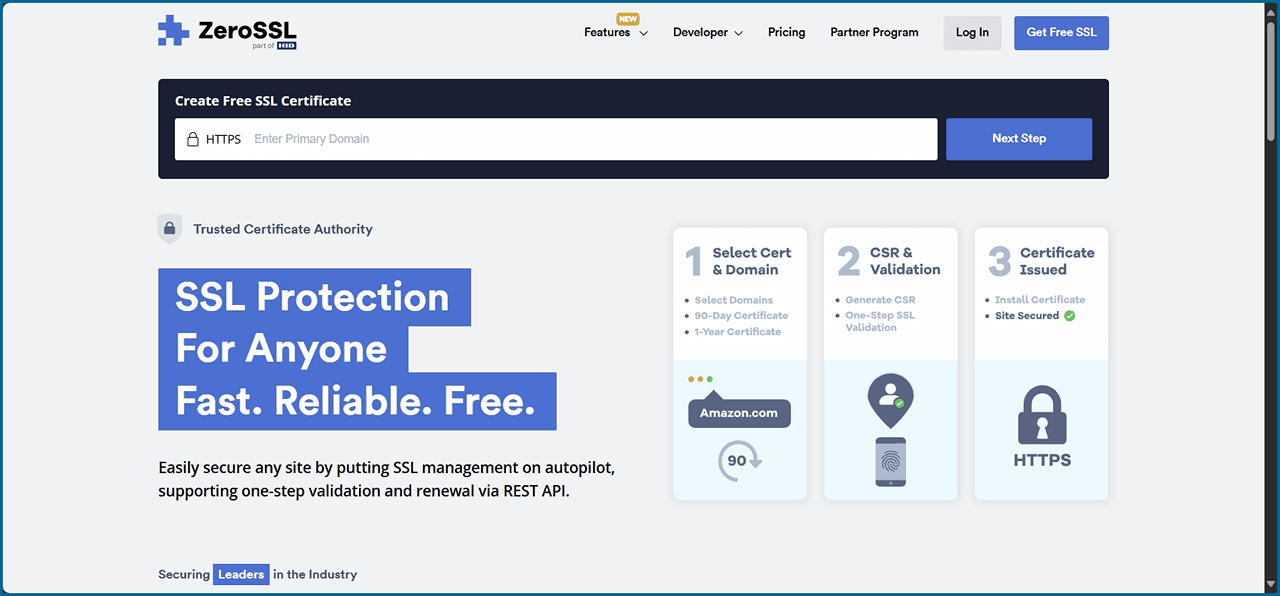
What sets ZeroSSL apart:
- Clean, intuitive web dashboard
- 90-day free DV certificates
- Supports wildcard and multi-domain certificates
- ACME protocol compatibility
- Email notifications before expiry
Perfect for: Beginners who prefer a visual interface over command-line tools. The web dashboard makes certificate management feel less technical.
Limitations: Free accounts are limited to 3 active certificates at a time through the web interface, though you can issue unlimited certificates via ACME.
Pro tip: ZeroSSL’s web interface is particularly helpful if you’re managing certificates for clients or multiple domains and want a central dashboard to track everything.
3. Cloudflare Universal SSL: The Effortless Option
If your website uses Cloudflare’s CDN and DNS services, you get free SSL certificates automatically through their Universal SSL feature.
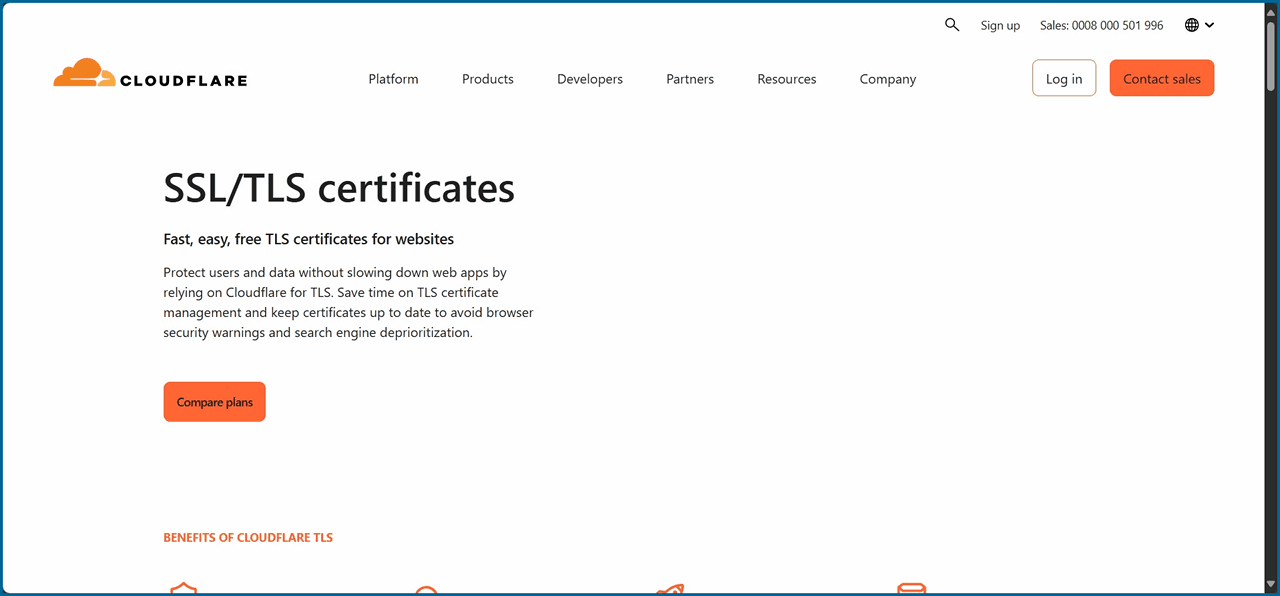
Why Cloudflare SSL rocks:
- Completely automatic – no setup required
- Flexible SSL modes for different configurations
- Edge certificates for lightning-fast performance
- Free with all Cloudflare plans
- Automatic renewal handled by Cloudflare
Perfect for: Website owners already using Cloudflare or those who want the easiest possible SSL setup.
Important note: Cloudflare’s free SSL provides encryption between visitors and Cloudflare’s servers. For end-to-end encryption, you’ll need to install an origin certificate on your hosting server too (also free from Cloudflare).
The migration story: Many website owners discover Cloudflare SSL after experiencing slow loading times. One small business owner told me their site speed increased by 40% after switching to Cloudflare, with SSL as a bonus feature.
4. SSL For Free: The Quick Solution
SSL For Free operates on ZeroSSL’s infrastructure but offers a streamlined interface specifically designed for quick certificate generation. They also offer free SSL certificates, just like ZeroSSL.
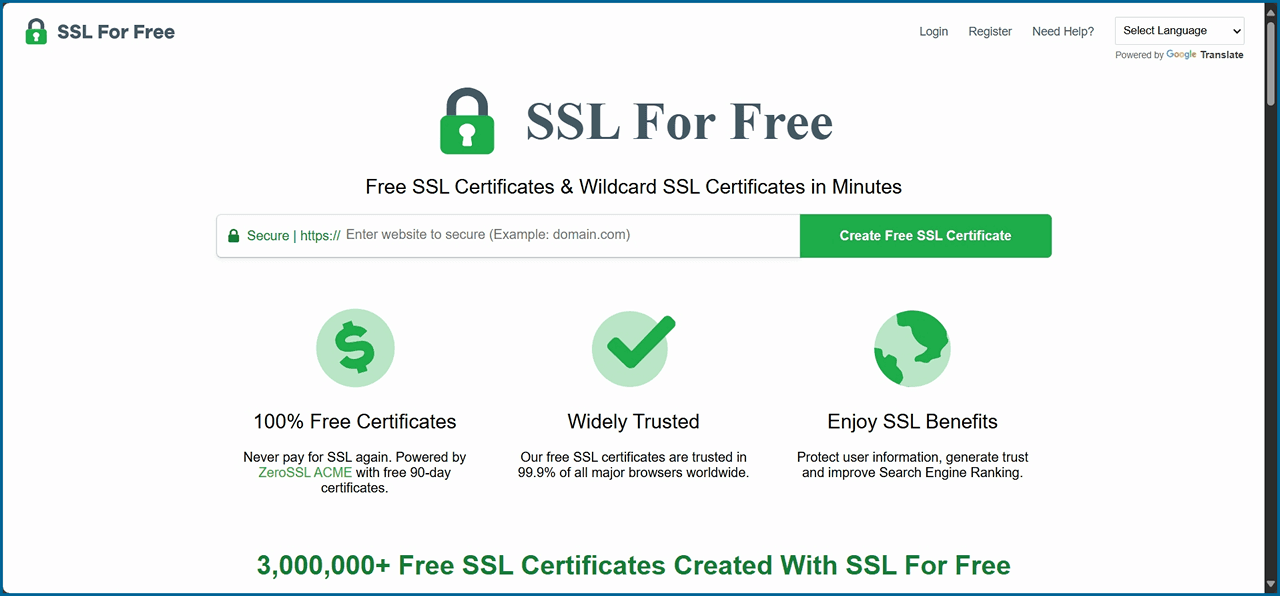
Key features:
- Simple three-step certificate generation
- 90-day validity
- Domain and wildcard support
- Email reminders before expiry
- No account required for basic usage
Perfect for: Developers who need certificates quickly for testing or small projects.
Workflow: The process is remarkably simple – enter your domain, verify ownership through DNS or file upload, then download your certificate files. The entire process takes about 10 minutes.
5. Buypass Go SSL: The Long-Lasting Choice
Buypass, a Norwegian certificate authority, offers free SSL certificates with 180-day validity, twice as long as most competitors.
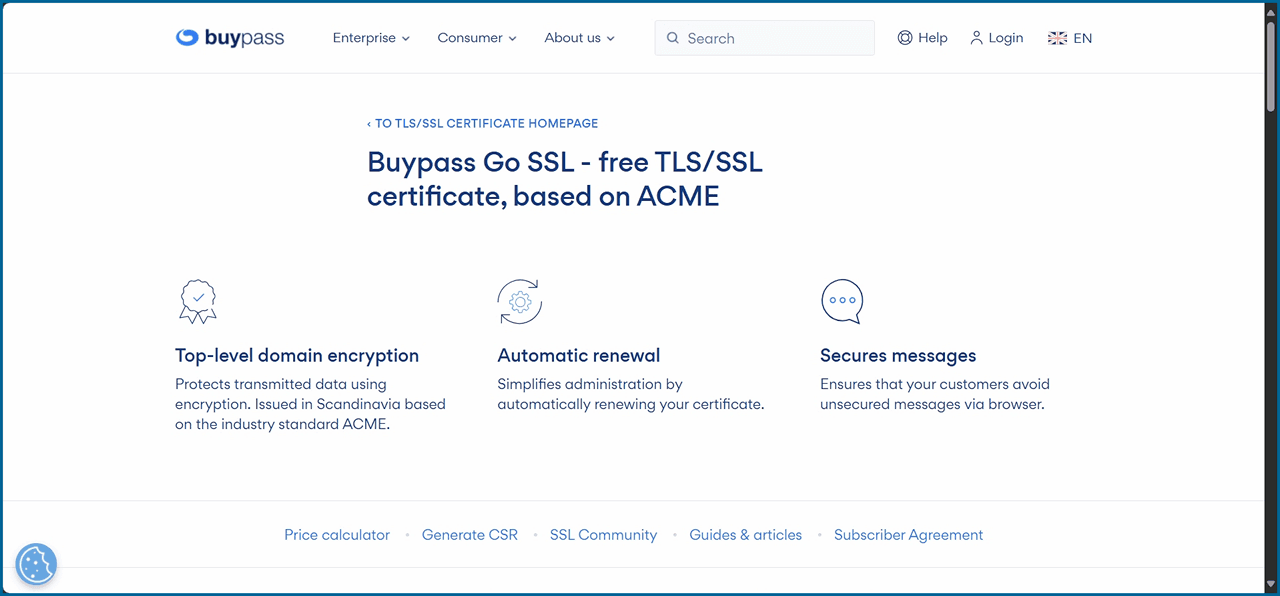
Standout features:
- 180-day certificate validity
- ACME protocol support
- Trusted by major browsers
- No commercial strings attached
Perfect for: Users who prefer longer certificate lifespans and don’t need wildcard certificates.
Trade-off: While certificates last longer, Buypass doesn’t support wildcard certificates in their free SSL tier. You’ll need separate certificates for each subdomain.
6. FreeSSL: The Flexible Option
FreeSSL offers an interesting mix of free SSL certificate options, including some longer-validity certificates for single domains.
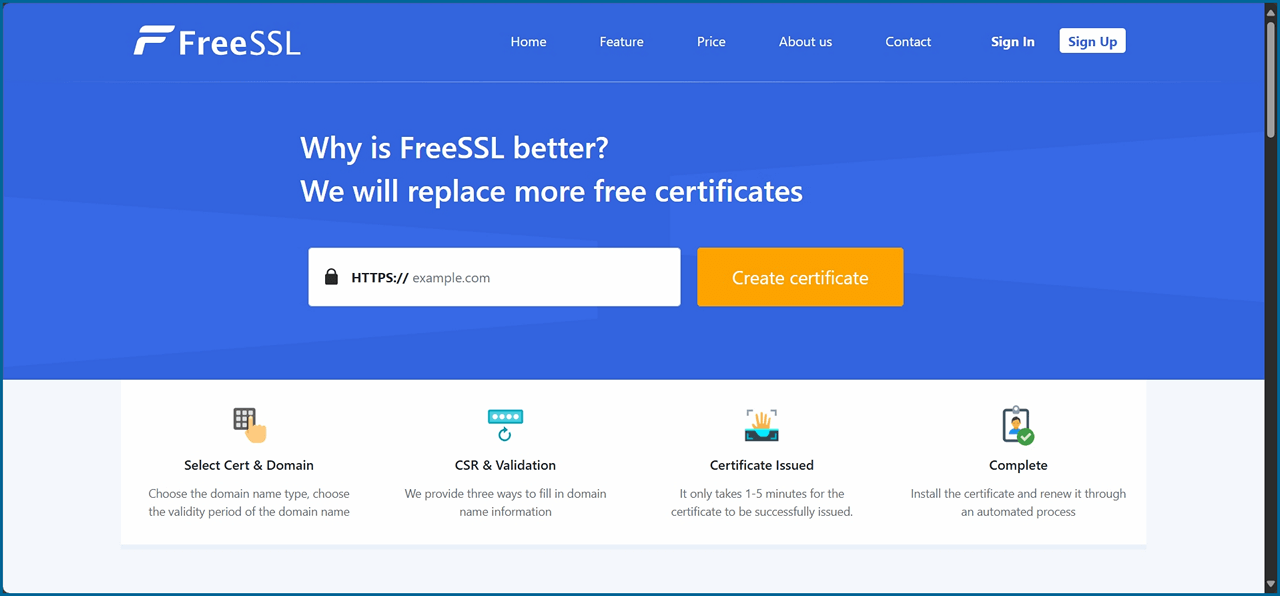
What’s unique:
- Both 90-day and 1-year certificates are available
- ACME protocol compatibility
- Multiple certificate authorities supported
- Simple web interface
Perfect for: Users who want flexibility in certificate validity periods.
Getting the 1-year certificate: The annual free SSL certificates are limited to single domains (no subdomains) and require account registration, and can significantly reduce renewal frequency.
7. SSL.com Free Certificates: The Enterprise Touch
SSL.com, known for premium certificates, also offers free DV certificates through its ACME service.
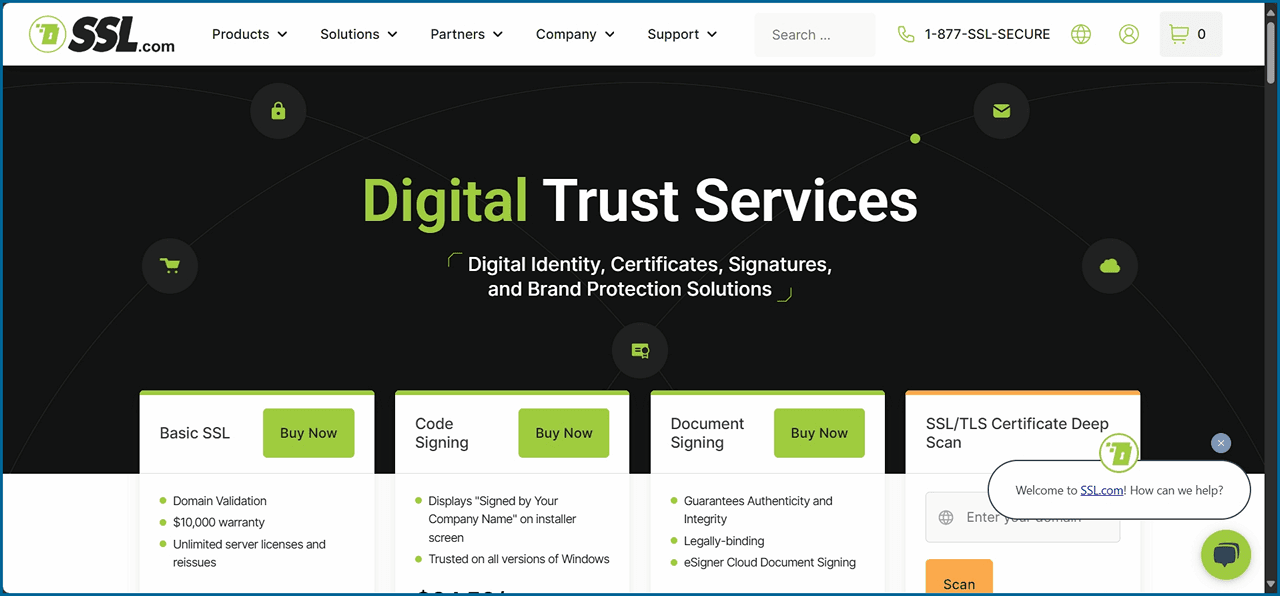
Enterprise-grade features:
- 90-day DV certificates
- Covers the domain and the www subdomain
- High-trust certificate authority
- ACME automation support
Perfect for: Businesses that want to test SSL.com’s service before potentially upgrading to paid certificates.
Consideration: The setup process is more technical than some alternatives, making it better suited for users comfortable with ACME clients and command-line tools.
Trial and Testing Options
GoGetSSL, Comodo, and Sectigo Free Trials
Several premium SSL providers offer free SSL certificates for trials. These aren’t meant for long-term use but can be valuable for testing or temporary projects.
Trial certificate characteristics:
- 90-day validity
- No automatic renewal
- Full DV validation
- Same encryption strength as paid certificates
Use cases for trials:
- Testing SSL implementation on staging servers
- Temporary protection while setting up permanent certificates
- Evaluating premium features before purchase
Why trials matter: Sometimes you need to test how your application handles SSL certificates before committing to a long-term solution. These trials provide that opportunity without financial commitment.
Platform-Specific Free SSL Options:
1. AWS Certificate Manager: For Amazon Web Services Users
If your website runs on Amazon Web Services, AWS Certificate Manager provides free SSL certificates that integrate seamlessly with AWS services.
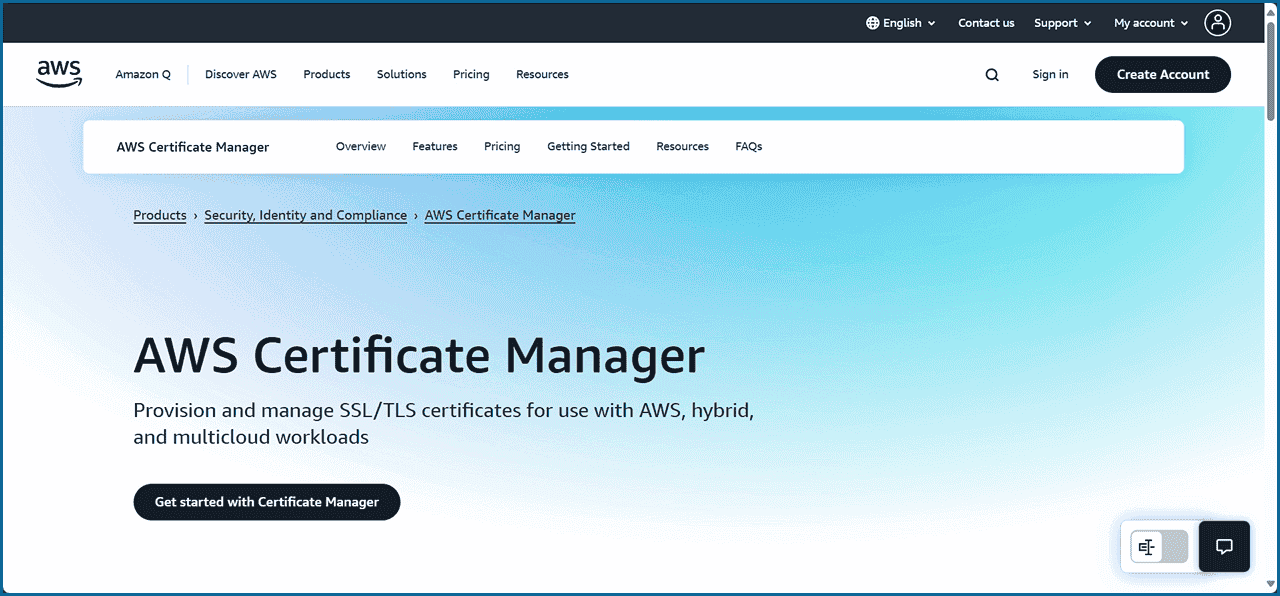
AWS ACM benefits:
- Free public certificates for AWS resources
- 13-month validity (395 days)
- Automatic renewal attempts
- Integration with ELB, CloudFront, and API Gateway
Important limitation: These certificates only work with AWS services. You can’t download them for use on external servers.
Cost savings: For AWS users, this represents significant savings. Premium SSL certificates for enterprise applications can cost $300-1000 annually, but AWS provides them free for its platform.
2. Google Certificate Manager: For Google Cloud Platform
Google Cloud Platform users get free SSL certificates through Google Certificate Manager.
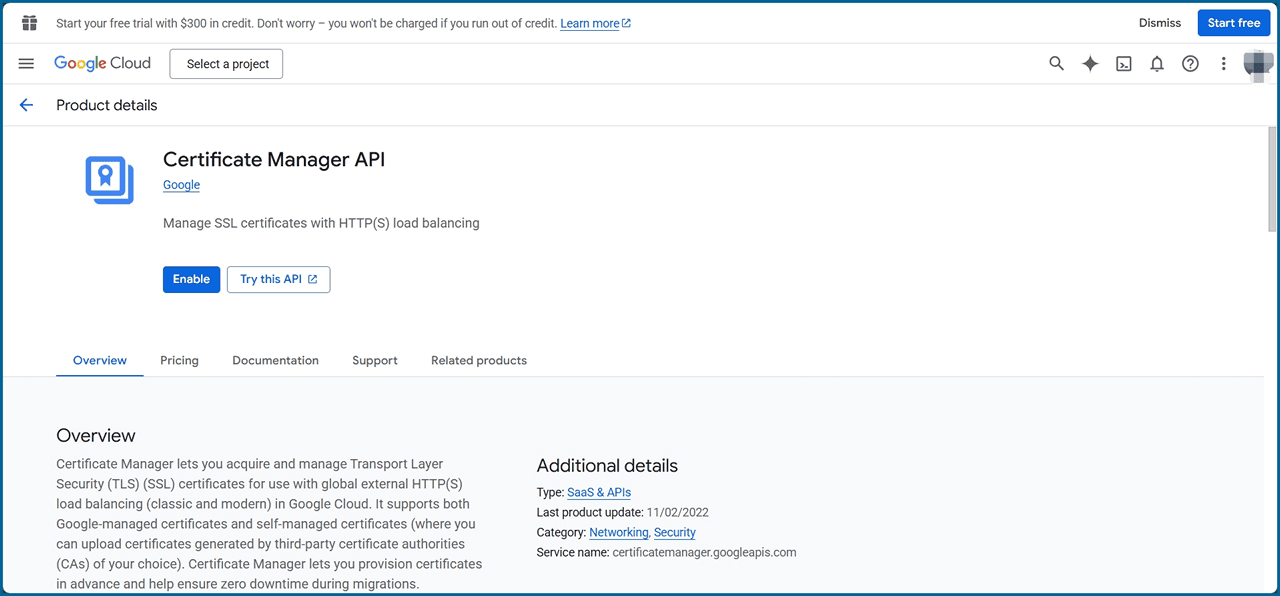
GCP SSL features:
- Free Google-managed certificates
- 90-day validity with automatic renewal
- Integration with Google Cloud Load Balancer
- No certificate management overhead
Platform lock-in: Like AWS, these certificates only work within Google’s ecosystem.
3. Alibaba Cloud SSL: For Alibaba Cloud Users
Alibaba Cloud offers free one-year DV certificates for users of their cloud platform.
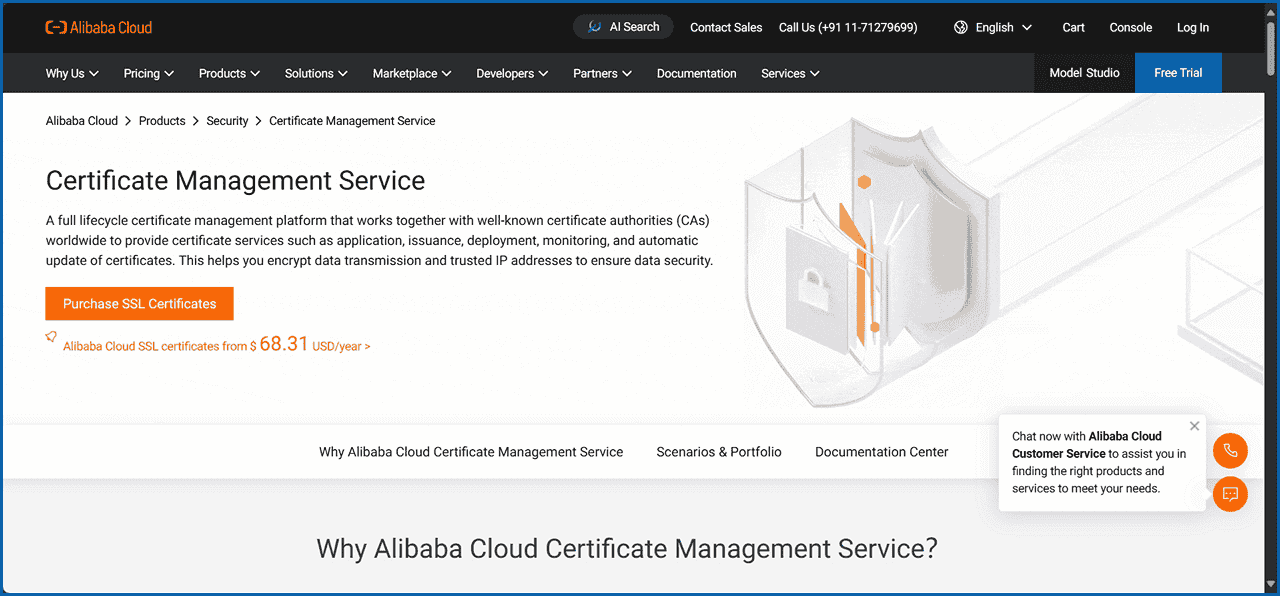
Alibaba Cloud perks:
- Full one-year validity
- Single domain coverage
- Integrated with Alibaba Cloud services
- Manual renewal process
Geographic consideration: While technically available globally, Alibaba Cloud SSL is primarily designed for users in Asian markets where Alibaba has a strong presence.
Choosing the Right Free SSL Provider for Your Needs
Selecting the best free SSL provider depends on your specific situation. Here’s how to think through your options:
- For beginners: Start with Cloudflare Universal SSL if you’re willing to use their DNS service, or ZeroSSL if you prefer a simple web interface. Both offer excellent support and user-friendly setup processes.
- For developers: Let’s Encrypt remains the gold standard due to its widespread support and ACME automation. Most development tools and hosting providers have built-in Let’s Encrypt integration.
- For businesses: Consider SSL.com’s free tier if you might upgrade to OV or EV certificates later, or Let’s Encrypt for straightforward DV needs.
- For cloud users: Use your cloud provider’s native SSL service (AWS ACM, Google Certificate Manager, or Alibaba SSL) if you’re already committed to their ecosystem.
- For long-term projects: Buypass offers 180-day certificates, reducing renewal frequency, while FreeSSL.org provides 1-year options for single domains.
Conclusion
Free SSL certificates have standardised web security, making it possible for anyone to protect their website without financial barriers. Whether you choose Let’s Encrypt for its universal compatibility, ZeroSSL for its user-friendly interface, or Cloudflare for effortless automation, you’re getting enterprise-grade encryption at zero cost.
The days of choosing between security and affordability are over. Your visitors deserve a secure browsing experience, search engines reward HTTPS sites with better rankings, and your reputation benefits from that trust-building padlock icon.
Don’t wait another day to secure your website. Pick a provider from our list, follow their setup instructions, and join the billions of websites already protected by free SSL certificates. Your visitors – and your search rankings – will thank you.
Ready to get started? Head over to Let’s Encrypt or ZeroSSL right now and get your first free SSL certificate installed today. The process takes less than an hour, and you’ll wonder why you waited so long to make the switch.
Frequently Asked Questions:
Are free SSL certificates as secure as paid ones?
Absolutely! Free SSL certificates use the same encryption algorithms and key lengths as expensive certificates. The difference lies in validation level and support services, not security strength. A DV certificate from Let’s Encrypt provides identical encryption to a $500 EV certificate.
How often do I need to renew free SSL certificates?
Most free SSL certificates last 90 days, though some providers like Buypass offer 180-day certificates. Don’t worry about the shorter lifespan – automated renewal tools handle this seamlessly. The frequent renewal improves security by ensuring you’re always using current certificates.
Can I use free SSL certificates for e-commerce websites?
Yes, free DV certificates work perfectly for e-commerce sites. They provide the same level of encryption for customer data as expensive certificates. However, some customers feel more confident seeing organisation-validated certificates on high-value purchases, so consider your audience’s expectations.
What happens if my free SSL certificate expires?
If a certificate expires, visitors will see security warnings and may be unable to access your site. Set up automatic renewal or calendar reminders to prevent this. Most hosting providers offer automated renewal for popular free SSL providers.
Do free SSL certificates work with all browsers?
Yes, certificates from reputable free providers like Let’s Encrypt, ZeroSSL, and others are trusted by all major browsers, including Chrome, Firefox, Safari, and Edge. They maintain the same root certificate relationships as commercial certificate authorities.
Can I get wildcard certificates for free?
Yes! Let’s Encrypt and ZeroSSL both offer free wildcard certificates that secure your main domain and all subdomains (*.example.com). The setup requires DNS verification rather than file-based verification, but the process is well-documented.
Is there a catch with free SSL certificates?
The main limitations are shorter validity periods (90 days vs. 1-2 years for paid certificates) and domain validation only (no organisation or extended validation). Some providers limit the number of free certificates you can have active simultaneously, but these limits are generous for typical use.
How do I move from a paid SSL certificate to a free one?
The transition is straightforward – obtain your free certificate, install it on your server, and let the old paid certificate expire. Make sure to update any automation or monitoring systems to work with your new certificate provider. Most website visitors won’t notice any difference in functionality or security.

